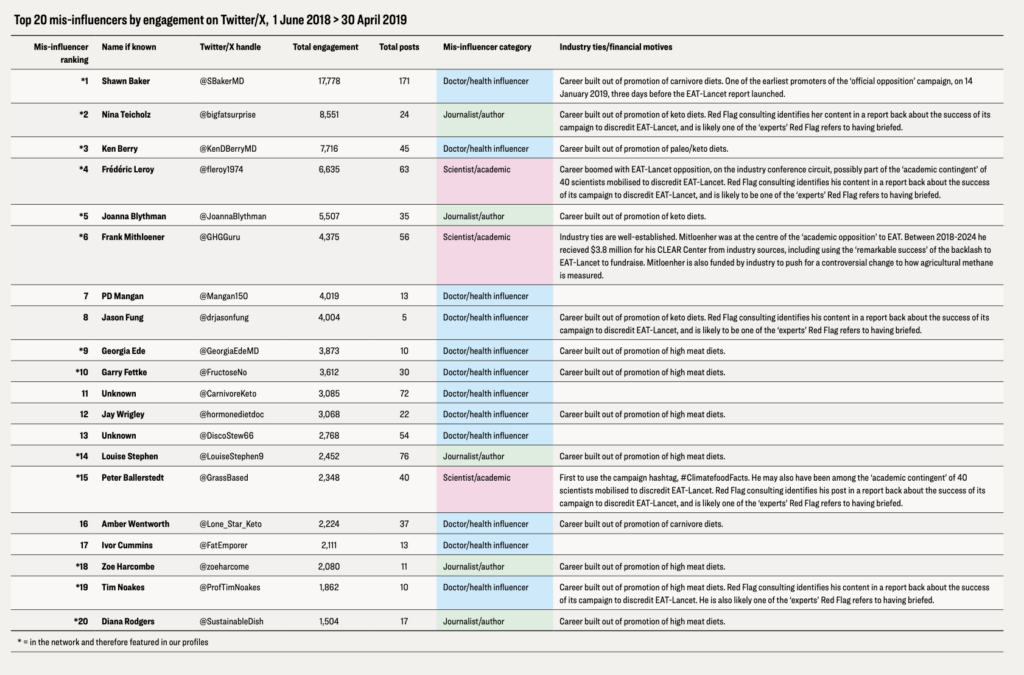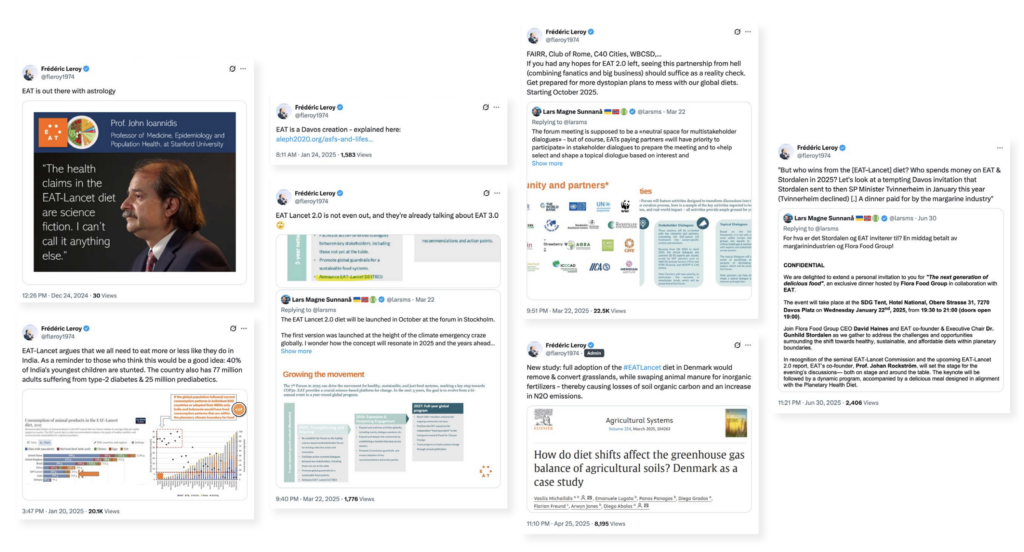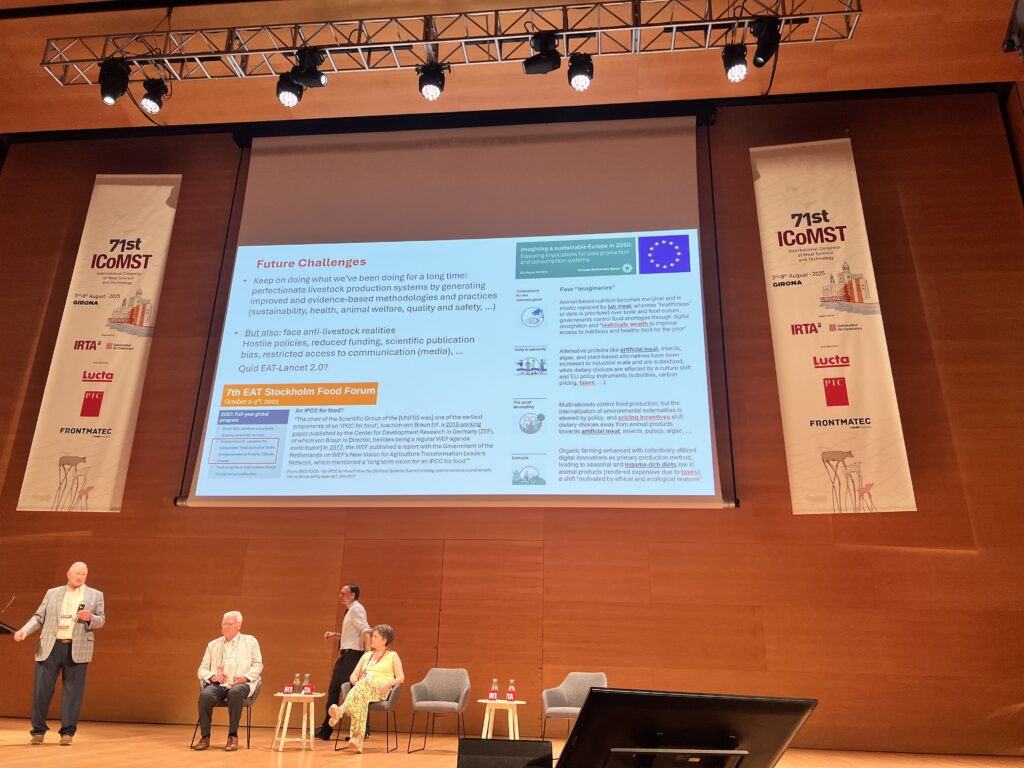Ahead of the Eat-Lancet Commission’s updated report on the Planetary Health Diet, the meat industry is gearing up for a misinformation campaign to discredit the science.
In 2019, the Eat-Lancet Commission released one of the most influential academic studies about the food system ever.
Comprising 37 leading scientists from 16 countries, the commission laid out a framework for the Planetary Health Diet, a way to feed 10 billion people and keep the planet healthy by 2050.
It recommends that fruits and vegetables should make up over half of people’s diets. As for the rest, more than a third should come from whole grains, plant proteins and plant oils, while dairy products, meat and seafood should only make up 3.6% each.
Subsequent studies have shown that following this dietary pattern could lower global emissions by between 17% and 29%, and reduce the risk of premature death by 30%.
However, despite garnering over 600 policy citations in six years, the report has done little to move the needle on a consumer level. Global meat and dairy consumption is set to rise by 6% per capita over the next decade.
A major factor behind this is an influential misinformation drive orchestrated by the meat industry. Research has shown evidence of a “massive coordinated campaign” that was successful in convincing audiences to turn away from the Eat-Lancet report.
Now, as the Eat-Lancet Commission prepares to release a 2.0 update on October 3, there are already signs that online misinfluencers linked to the livestock lobby are working to undermine the new report, according to the Changing Markets Foundation.
“Our research shows more clearly than ever that the meat industry is increasingly fighting science and progress with misinformation and dark online forces. With the web becoming lawless and AI tools rising, online misinfluencers we identified are more powerful today than ever before,” said Nusa Urbancic, the organisation’s CEO.
Behind the backlash against the original Eat-Lancet report

Changing Markets Foundation noted that the “potential of the report to lead to regulation and societal change” had posed a serious threat to Big Meat and Dairy, spurring immediate backlash against the publication and the commission.
This included misinformation, conspiracy theories and personal attacks on the authors, and had real-world impacts – in March 2019, the World Health Organization withdrew its sponsorship of an event promoting the Eat-Lancet report, following pressure from the Italian government.
The online campaign was dominated by the #Yes2Meat hashtag, which reached 26 million people on what was then called Twitter, a million more than posts that promoted the research. The negative tweets successfully attracted ‘undecided’ users, being shared six times more than supportive posts.
“Our analysis of the initial backlash period identifies 100 misinfluencers responsible for nearly 50% of posts that formed the backlash on Twitter, and over 90% of total engagement. None appear to be bot accounts, but real and very committed people,” Changing Markets Foundation said.
Among those with the highest engagement were personalities like carnivorist Shawn Baker, pro-meat journalist Nina Teicholz, paleo diet influencer Ken Berry, and pro-meat scientists Frédéric Leroy and Frank Mithloener.
Leroy was the central figure in what the investigation described as a “tightly coordinated network of misinfluencers”. He pre-emptively attacked the Eat-Lancet report to lay a foundation for others, and following the publication, he created conferences and narratives for the industry to use to undermine its findings.
The Meat Institute, the livestock sector’s largest trade association, also played a hand, mobilising a community of the top diet and health misinfluencers. It worked with Red Flag, a public relations firm for the meat, chemical and tobacco industries, which celebrated the backlash to the Eat-Lancet report as a “remarkable success”.

The meat industry is already preparing to attack Eat-Lancet 2.0 report
The Eat-Lancet 2.0 report will be published in a much more hostile environment than in 2019, according to the Changing Markets Foundation, which explained that the reach and public acceptance of many misinfluencers have grown.
New narratives have appeared, many rooted in conspiracy theories and fuelled in part by far-right politicians. Social media platforms have loosened tools that keep misinformation in check (especially after Elon Musk’s takeover of what is now called X), and artificial intelligence (AI) has made it easier for these influencers to generate more tailored and convincing content.
Pro-meat messaging continues to rise ahead of the updated Eat-Lancet report next month – the #Yes2Meat hashtag was used over 2,000 times between June 2024 and May 2025, and #MeatHeals, also used to promote such narratives, was used more than 8,000 times.
Audio recordings from a taxpayer- and industry-funded conference reveal that the new report will come under attack, with figures behind the original backlash agreeing on the need for an “urgent” communications and lobbying campaign. This won’t be based on science alone, with one consultant telling delegates that “scientific facts are not as critical as ‘who you are’” and “truth is a relative concept”.

Leroy and Telcholz have been the most prolific in attacking the 2.0 report ahead of time, warning consumers of “dystopian plans to mess with our global diets” and discrediting investigative reporting about the meat industry’s campaign as “an unverified story [that] will likely be used to smear any efforts to criticise Eat-Lancet’s next nutrient- and protein-deficit diet”.
Further, Changing Markets Foundation highlights the impact of the manosphere and carnivore diet boom, a space led by influencers like Joe Rogan, Jordan Peterson, and Andrew Tate. The rise of generative AI, meanwhile, has accelerated disinformation, thanks to deepfakes, automated bots, and targeted curation.
There are two types of narratives that are likely to dominate the pushback against Eat-Lancet’s upcoming report. The first involves a disparaging campaign, with the meat industry set to malign and vilify the Planetary Health Diet as bad for human and planetary health, playing to the culture wars and spreading conspiracies that the “elite are planning ‘A Great Reset’”.
The second narrative will see the influencers try to enhance the reputation of animal proteins by promoting them as good for health and biologically necessary for humans, as well as greenwashing consumers about their environmental impact.
At this critical moment, the scientific community and policymakers must be aware of those working overtime to slow progress to better health and environmental protection,” said Urbancic. “This is a fight we cannot lose.”
Source link
Heart surgeon with 25 years of experience shares the benefits and health risks of carnivore diet: ‘It’s extreme’
Fitness influencers swear by the ‘carnivore diet’: What doctors think
No evidence behind RFK Jr’s claim keto diet can cure schizophrenia, experts say | Robert F Kennedy Jr
